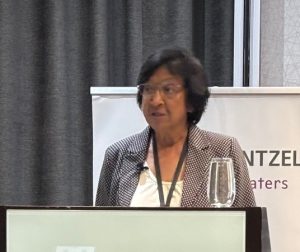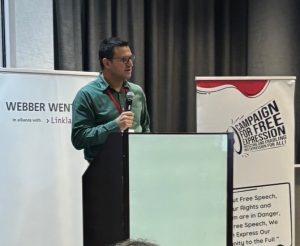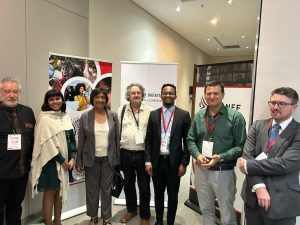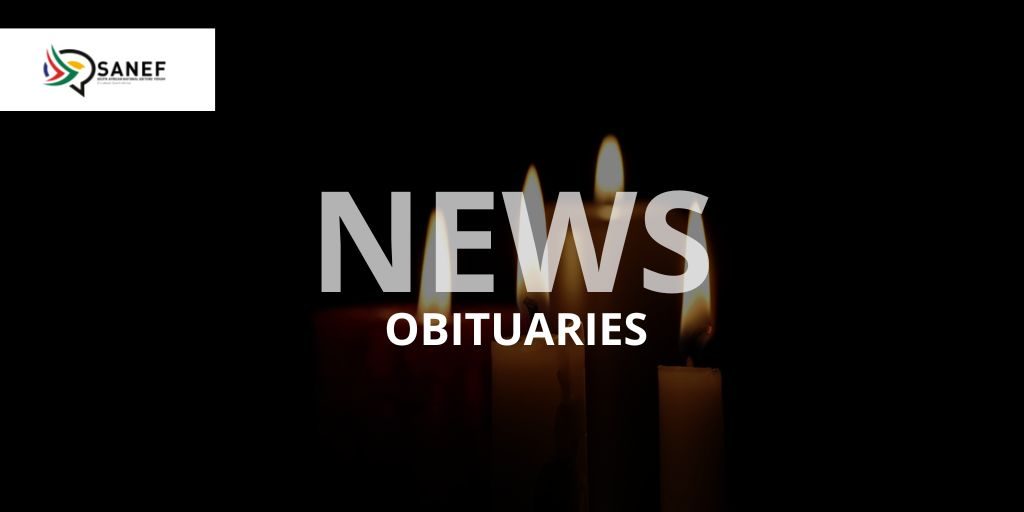The Free Expression Legal Network
The Free Expression Legal Network: A New Era for Media Freedom

In a landmark initiative to defend media freedom and uphold free expression, the Free Expression Legal Network was officially launched in Johannesburg on February 18, 2025, to fortify legal protections for those who risk their lives and careers to bring truth to the public.
Developed through a collaboration between the South African National Editors’ Forum (Sanef), the Press Council, the Campaign for Free Expression (CFE), and other key stakeholders, the network had more than fifty attendees, including prominent legal experts, journalists, and civil society representatives at the offices of Webber Wentzel in Sandton.
The network aims to provide legal assistance to journalists, small media outlets, and community-based organisations facing mounting legal threats. The initiative seeks to create a coordinated, international framework to safeguard free expression against increasing pressures from governments, corporations, and other entities that seek to silence dissenting voices.
Judge Navi Pillay, the esteemed former UN High Commissioner for Human Rights and keynote speaker at the launch, delivered a stirring address, underscoring the fundamental necessity of free expression. “A free, uncensored, and independent press is a cornerstone of democracy,” she stated. “It ensures informed public participation, accountability, and respect for human rights.”
The launch of the network comes when press freedoms are under severe strain worldwide. The erosion of journalistic protections, the growing use of surveillance technology, and the persecution of media professionals have led to what some are calling a global crisis in freedom of expression. Drawing from her vast experience in international human rights law, Judge Pillay highlighted these concerns in her keynote.
“They say that 2024 has been the worst year for journalists internationally, with the largest number of killings,” Pillay noted, citing UNESCO data that states 87% of journalist murders go unpunished. “Every day, we are reminded of how vital the information they provide is—not just for democracy, but for the fight against corruption and the preservation of peace and security.”
The dangers journalists face go beyond physical threats. The rise of sophisticated surveillance tools such as Pegasus spyware has made privacy a relic of the past. “It is frightening how powerful surveillance systems have become,” Pillay warned. “Governments and corporations must be held accountable for their use.”
A Legal Lifeline for Journalists
One of the primary objectives of the Free Expression Legal Network is to provide legal defense for journalists and media organisations lacking access to corporate or external legal representation. This initiative is particularly vital in South Africa, where economic pressures, declining media revenues, and legal intimidation have placed many journalists in precarious positions.

Dario Milo, a leading media law expert and partner at Webber Wentzel, stressed the urgency of the network’s mission. “The Free Expression Legal Network is a significant step forward in ensuring that journalists and human rights defenders have access to the legal guidance they need. At a time when media freedom is under increasing pressure, this initiative will play a crucial role in upholding the public’s right to know.”
Anton Harber, renowned journalist and Campaign for Free Expression Director, echoed this sentiment. “This network will be a vital tool in preventing attacks on free speech and free media,” he said. “It will ensure that anyone whose free speech is threatened is properly defended, while also proactively pushing for policy changes to strengthen press freedom.”
Judge Pillay dedicated a significant portion of her address to the pressing issue of digital surveillance, a tool increasingly weaponised against journalists worldwide. She recalled her work at the UN, where she first raised concerns about mass surveillance in 2013 after it was revealed that leaders such as German Chancellor Angela Merkel and Brazilian President Dilma Rousseff had their phones hacked.
“The General Assembly, in Resolution 68/167, directed me as High Commissioner for Human Rights to submit a report on the protection of privacy in the digital age,” she recounted. “That report established a global standard: human rights offline must also be protected online.”
Despite these legal frameworks, surveillance and data privacy breaches remain widespread. In South Africa, the Protection of Personal Information Act (POPIA) mirrors some of the European General Data Protection Regulation (GDPR) provisions, but Pillay pointed out its limitations. “POPIA does not require prior consent for data collection except in specific cases,” she explained. “We must remain vigilant and advocate for stronger safeguards.”
A Call to Action
Pillay urged the network to not only defend journalists in the courts but to actively shape the future of press freedom. “We should be proactive, not just reactive,” she emphasised. “Journalists must have their guiding principles, their own Code of Conduct, to prevent external interference in their work.”
She also encouraged collaboration with international efforts, such as the Information and Democracy Forum established in 2019. “If you clap with a single hand, nobody hears you,” she said. “But if a lot of people form a network and clap together, they will be heard. I can only see success for this initiative.”

The Free Expression Legal Network’s steering committee includes respected legal and media professionals, among them Dario Milo, Anton Harber, Advocate Ben Winks, Webber Wentzel Senior Associate Odwa Abraham, independent media consultant Izak Minnaar, Press Council Executive Director Phathiswa Magopeni, and constitutional and media law expert Avani Singh.
As the network begins its work, its leaders remain resolute in their commitment to protecting press freedoms and countering the forces that seek to silence independent voices. “We are building a strong defence,” Harber said. “In the face of growing threats, we must stand firm and act together.”
The Road Ahead
The next steps for the Free Expression Legal Network will be announced in the coming months. With growing global challenges to free speech, the need for such a network has never been greater. As Pillay’s speech made clear, the fight for free expression is far from over, but with legal expertise and collective action, journalists and media professionals can continue their essential work without fear.
“Freedom of expression is not just a right; it is the lifeblood of democracy,” Pillay concluded. “And it is our duty to protect it.”
For more information and documentation about the Free Expression Legal Network download:
- Media Lawyers Network Launch – PAIA reform.
- Anti-SLAPP Model Law Long Version Presentation.
- Legal Network launch Presentation.
ENDS/



